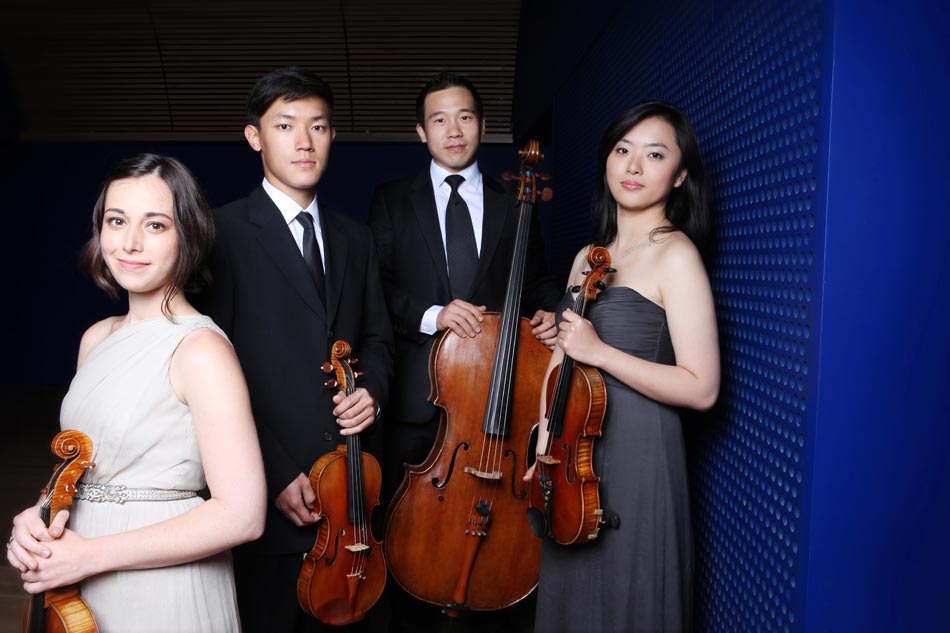“Much is asked of an audience experiencing new work with sounds that are less familiar, but the ear is quick and can adapt to new sounds when context is there to guide us.” This statement, from the program notes for Friday night’s Soundings: New Music at the Nasher concert, served as warning, plea, and promise: This might be a challenging listening experience. Don’t give up. The music will reward you.
What Soundings requested from its audience Friday night was time, attention, stillness, and an open mind. What it provided in return was a sonic safari, a carefully crafted tour of the periphery of tonality, timbre, and time. Guiding the audience through this journey were percussionist Ian Rosenbaum and the Parker String Quartet. Together, they performed nearly a dozen 20th and 21st-century works, many of which use microtonality and unexpected timbres and rhythms to create exotic atmospheric colorations. Beethoven’s riveting Grosse Fuga, Op. 133, full of its own innovations, rounded out the program.
The timing of Friday night’s concert collided with a classically powerful Texas storm. Leaving the roar of rain and thunder outside, the audience gathered in the peaceful basement of the Nasher Sculpture Center. Soundings director Seth Knopps addressed the group from the space’s large, open staircase. His quiet demeanor and thoughtful introduction set the tone for the evening. We were there as servants of a muse (the music), he reminded us, before instructing us to proceed into the hall as a group.
There was talking and shuffling of umbrellas and programs and then a gradual, slow realization that, while we were still finding our seats, the concert had begun around us and the storm outside had subsided. The ringing recorded sounds of Jonathan Harvey’s Mortuos Plango, Vivos Voco acted as the perfect prelude to this concert. As we sat enveloped by the quasi-tonal vibrations of a deconstructed bell, we were ushered into a heightened awareness of sound at its most basic form.
A brief Bagatelle by Webern (from Six Bagatelles, Op. 9, 1911-1213), Tan Dun’s Eight Colors for String Quartet (1986), and two works by Tawnie Olson for marimba and recorded bird song led up to the evening’s centerpiece, James Wood’s Déploration sur la mort de Gérard Grisey (2000). A sophisticated, technically challenging piece for string quartet and marimba, Wood’s Déploration was a showcase for this group’s artistry. On the marimba, Rosenbaum is an effortless virtuoso, his arms loose, his gestures free, the notes bouncing along like raindrops with mesmerizing accuracy and buoyancy. The Parker Quartet’s busy strings chattered back and forth, perfectly synchronized.
On the way to Déploration, the quartet’s gorgeous interpretation of Tan Dun’s Eight Colors was a highlight. The quartet displayed remarkable cohesion and range in this piece, slapping and plucking their instruments as they seamlessly passed rapid pizzicati passages back and forth, drawing far more than just eight aural colors from Dun’s score. The post-storm sunset behind them turned out to be a perfectly timed backdrop, slowly fading from pinkish yellow, to orange, to a purplish, almost fluorescent navy blue over the course of the piece.
All of this music, while beautiful, was a heavy first course for listeners. Rather than balancing this out with a shorter second half, this program offered an equally hefty portion of slightly more melodic, tonal material after intermission. Harry Partch’s sultry Two Studies on Ancient Greek Scales (1946) for string quartet bookended Luciano Berio’s 1980s Naturale, a stunning trio for viola, percussion, and recorded voice.
Following these pieces, we found ourselves in Beethoven’s hands. After so many diverse, atonal and microtonal sounds, I expected Beethoven’s Grosse Fuga to play a contrasting role, representing the safe familiarity of traditional western tonality. But this piece is not a safe one, and the Parker Quartet gave it an intense, vivid reading that felt as modern and unnerving as anything we’d heard that evening. In this context, Beethoven’s wild harmonies and mesmerizing melodies sounded entirely contemporary.
Yet another Webern Bagatelle followed the Beethoven before Ian Rosenbaum took the stage alone to perform the evening’s finale: Frederic Rzewski’s To the Earth. Over the course of the evening the audience had thinned, leaving only those who were willing to see this epic journey through to the end. And oh, what an ending. After so much complicated, complex music, we were offered a palette cleanser. A set of four clay pots attached to vertical two-by-fours acted as a makeshift marimba for Rosenbaum. Kneeling behind the clay pots with his mallets, Rosenbaum accompanied himself as he tenderly recited the song’s text: “To the earth, Mother of all, I will sing,” he began. This beautifully composed and performed song of praise to Mother Earth was mesmerizing both in its simplicity and universality. If Harvey’s Mortuos Plango, Vivos Voco was the perfect prelude to the evening, this was the perfect benediction.
As I sat through this program, I was overwhelmed by its scope. A thoughtful professor could craft an entire graduate-level musicology course around this program’s offerings alone. What this program needed was an editor. But what would you cut? The only pieces that felt superfluous to me were the Webern Bagatelles, which, combined, took up only a few minutes. Maybe the curated music during the intermission, also indicated in the program, was a bit much. But then again, in the moment, it felt like the perfect choice. As I reflected on the concert later I felt attached to each piece, in addition to the journey through which they collectively guided me.
In terms of both length and content, “In Return for My Song: Tonalities at Once Ancient and New” was one of the most challenging programs this series has offered in recent memory. It was also one of the most rewarding.






